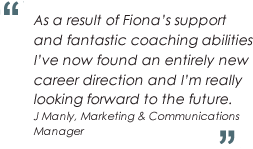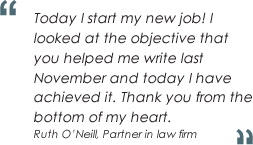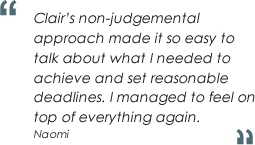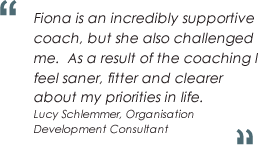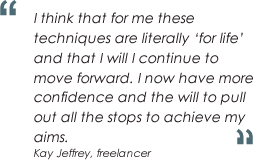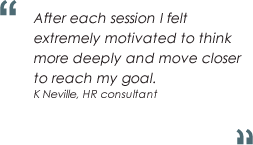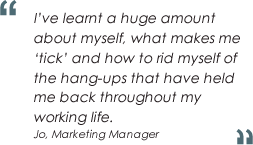-
Case Study 1
Emma took an extended break to be a full-time Mum and follow her husband's career moves around the world. She is now self-employed and helps other business manage their information and databases effectively for maximum commercial success.
Read more >>-
What is your new role?
- I work freelance helping businesses manage their information. I produce user-friendly, relevant reports to help them run their core business better. So I usually I work with their sales and customer information or their financial data. The two key benefits of my service are that it frees up business owners time and secondly it allows them to grow their business and make the right business decisions through better information management.
-
What difference has this made to your life?
- It has given me new focus and much more self-confidence as I've proved to myself that I can achieve goals that I have set out to do. On a practical level it is allowing me to work while still having the flexibility to be around for the kids when I need to be.
-
How has coaching helped?
- Coaching has made all the difference!
I'd thought about various business ideas and considered looking for employment for a long time but I lacked the confidence to commit to anything and even to take the first steps of researching any of my ideas.
Coaching with Fiona helped me to work out what was important to me, decide what needed to be done and break everything down into manageable tasks. Fiona was always encouraging and supportive and inspired me to believe that I could make my goal a reality. Going forward, I plan to continue my coaching sessions in order grow my business and set new goals for the future.
-
How long did it take you to make the change?
- I thought about this particular business idea for a long time, but had always talked myself out of doing anything about it. Once I put my mind to it and with Fiona's help I had secured my first paying client within 3 months of starting my coaching.
-
What have you learnt?
- It has reminded me that I do have skills that are valuable outside my family life and whilst I was always worried and conscious about whether it would take my time away from my kids I have found that they are really interested in what I am doing and proud of me.
-
What advice would you give others thinking of career change?
- Just do it! It is scary but whatever you are thinking of doing break it down into manageable chunks and set yourself short-term realistic targets and you'll be amazed how much you can achieve over the weeks.
-
-
Case Study 2
Deborah was an Accountant working in a large city based firm but was stressed and desperately unhappy with the role and hours she had to work. She is now doing a job she loves and that matches her natural skills.
Read more >>-
What is your new role?
- I have always had an artistic eye and been good with my hands making curtains and duvet covers came easily to me. I am now working as an Interior Designer and we also buy and renovate properties for the rental market.
-
What difference has this made to your life?
- I went into Accountancy initially because it seemed like a proper career but when I made that decision I didn't think through whether it would suit my personality. I now love my work, to the point where it doesn't really feel like work. More like a hobby that I get paid for!
-
How has coaching helped?
- The two most useful things about the coaching were identifying what I really wanted in life and working out the skills that I was particularly good at and enjoyed using. I also had lots of negative beliefs that were holding me back so the coaching helped me to think much more positively and overcome those beliefs.
-
What have you learnt?
- That life is too short to be a career that isn't suited to your skills and strengths.
-
What advice would you give others thinking of career change?
- Don't assume that you can't make decent money doing you something you love, and if you are feeling stuck then get some coaching there are always ways out of the rut you feel you are in!
-
-
Case Study 3
Jo worked for a recruitment advertising agency for 14 years and had been with this company since leaving University. Jo had progressed to Director level but the commute had become unsustainable following an office move and she had a growing sense of dissatisfaction. She is now a Marketing & Communications Manager in a school that is a 5 minute walk from her house.
Read more >>-
What is your new role?
- I am the Marketing and Communications Manager for the private school in my village. Longer term, I am also considering a portfolio career and over time I may take on some freelance marketing and communications work to boost my hours and income.
-
What difference has this made to your life?
- My work-life balance is significantly better and I am much less stressed on a day to day basis. I can enjoy work and my family much more easily as most of my work is term-time. My confidence and energy levels are much better and I feel like I'm enjoying life again.
-
How has coaching helped?
- I used the coaching to identify what motivated me, my core skills and potential career paths and then I enlisted Fiona's help to sell myself properly on paper and at interview.
I also needed help to find the time and energy to change my career as I was feeling low in confidence and too busy at work and home to find time to sort myself out!
The coaching made me realise that I had lots of transferable skills that I could offer an employer in a different industry. The interview practice I had with Fiona revealed a tendency to down play my strengths so that was a really useful element of the support I had.
-
What have you learnt?
- I've learnt a huge amount about me, what makes me tick and how to rid myself of some of the hang-ups I've let plague me throughout my working life.
-
What advice would you give others thinking of career change?
- Get clarity on the direction you want to take before diving in to update a CV and apply for random jobs.
-
-
Case Study 4
Katherine was a business intelligence manager before she had children which involved supporting sales and marketing teams with all the data and analysis they needed to make business decisions. After her maternity leave she decided she needed to find a new role that allowed her to fall back in love with her work and fit round the needs of her family.
Read more >>What is your new role?
I work for a medium sized pharmaceutical company in a commercial management role. Although the role was advertised as full time, the company was happy to adjust the role so that I could work 4 days a week. They are really supportive of part time working and flexible hours. The role is much more project based than my previous one so I can manage my own deadlines more and be more in control of my activities. There is quite a lot of overlap with previous roles so it turned out that I didn’t need a complete career change, just a slight change of direction and a different company culture.
What difference has this made to your life?
I have found that having a shorter commute has made a big difference and given me valuable time back. Having a job that can be done in a normal working day means that I rarely have to bring work home, allowing me to focus on my family when I am not at the office. I have discovered finding time for a hobby or two makes me a lot happier even though it means I have less time to squeeze in all of the chores!
How has coaching helped?
It allowed me to make a checklist of the most important things to look for in a job or company. I was able to get clarity on what I might compromise on and what I wouldn’t. Through coaching it became clear why I was not happy with previous roles and it gave me the confidence to be very selective when choosing my next role.
What have you learnt?
The main thing I’ve learnt is that you may not have to change your career completely to find the right role. For me, it was a few important tweaks that got it back on track. I discovered that one of most important factors for me is working within an industry I feel strongly about. I am deeply interested in what the company does and I feel that I can make a real difference.
What advice would you give to others thinking about a career change?
Firstly I’d say be picky – I made the mistake of taking a new job just because it was 3 days a week. The job, company and commute were awful and even though it was part time, it wasn’t right for me and made me very unhappy. Secondly, be honest at interviews – if you are upfront about the hours you want to work, the right company will be happy with that. I really thought I had talked myself out of my current job during the interview but instead they offered it to me and said they admired my honesty.
-
Case Study 5
Alison worked in the global pharmaceutical industry for over 15 years and held various roles and positions across different sectors and businesses. Despite working on some great brands, life with a young family was a constant logistical battle. Alison wanted to change career and gain greater flexibility>>
Read more >>What is your new role?
A friend introduced me to a global online health and beauty franchise which is attached to industry leading products. Unlike many other businesses, this opportunity allowed me to start my own business with minimal investment and to run it from home in my own way and on my own time. Being a franchise model there is a proven success model and endless support from people and leaders in the business who have made this work for them and genuinely want you to succeed as well.
What difference has this made to your life?
I am far less stressed and no longer feel torn between work and family as I am in control of my time and my schedule. I am relishing the new challenges and experiences and getting out of my comfort zone. In turn I am learning that the things you thought weren’t possible and that you couldn’t do, you can – you just have to try and be willing to be coachable. I have also realised that it is possible to have professional success without feeling like I am compromising my family.
In what way did the coaching help you?
It gave me a clearer understanding of myself and my motivations which in turn allowed me to be more open to different opportunities. Ultimately I credit the coaching experience with allowing my new business to find me. I took the time to listen fully, look at the evidence available and then evaluate and make a decision – rather than reject on instinct something that felt different, out of my comfort zone.
What are your future plans?
I have realised that I prefer having a portfolio career rather than focusing solely on one job. I am fully committed to growing my business and working with others to do the same. Alongside this I am undertaking consultancy projects in my field of expertise, ensuring I focus on the aspects and skills I really enjoy using and which allow me to continue to work flexibly from home and be there for my family.
What advice would you give to others?
Don’t shy away from new challenges, if you aren’t satisfied, do something – even if it is only a small step. Try not to act on instinct and say “no” to opportunities you come across. Instead weigh them up, talk to people who are knowledgeable and experienced on the subject, do your research and then make your own decision.View all experiences, good and bad, as a learning experience which will help you in the future.
-
Case Study 6
Mary decided to change career following the birth of her second child and set up her own business creating children’s toys that combine design with function.
Read more >>What is your new role?
I took the plunge and followed my passion for design to start my own business “Squidge and Pip”, creating innovative, high functional baby and toddler products that stand out from the crowd.
What difference has this made to your life?
Being a mumpreneur has given me a massive sense of purpose and achievement. I’m always very proud to tell people what I do and this has really helped boost my confidence levels. It’s fantastic doing a job that gives me lots of positive energy so I can really go for it.
How has coaching helped?
There are so many different elements that go into starting a business. Although I felt very comfortable during the design stage, I was extremely nervous and insecure when it came to actually launching my products to a wider audience. I’d never done anything like this before and felt well and truly out of my comfort zone. My coaching with Fiona helped me enormously – Fiona broke it down into manageable chunks so it felt less overwhelming. We then brainstormed lots of different scenarios and prepared the relevant answers so I felt well-equipped for my first trade show.
What have you learnt?
An unbelievable amount – but I think the biggest thing is the importance of believing in yourself. I’m a big believer that ideas come to you for a reason. In my case, it was the right time in my life to do something creative and this spurred me on in my journey.
What advice would you give to others thinking about a career change?
Everyone is different – but I think it’s has to be the right time for you to make a change. I was lucky to have the support of friends and family around me as I started my business, which made such a difference in the early stages when I was juggling the design phase with childcare.
www.squidgeandpip.com
-
Case Study 7
Steph worked in corporate responsibility for a non for profit organisation for nearly 14 years, before following her passion and using her transferable skills to build a new career as a freelance historical researcher working for one of the UK’s leading historical agencies.
Read more >>Tell us about what you are doing now?
I’m working as a freelance researcher and writer. I’ve been lucky enough to be able to use my old contacts to gain work related to my previous career but more excitingly have started developing a new career as a historical researcher working for one of the UK’s leading historical agencies.
What career path did you have before that, and why did you want a change?
I was working in corporate responsibility for a non for profit organisation. Prior to that, I spent several years working in strategy consulting (both as a consultant and in communications roles.) There was nothing fundamentally wrong with what I did before; I had negotiated part-time working, it was interesting and I got to work with and meet some fantastic people. However after nearly 14 years in the same organisation, I had begun to feel stale and couldn’t see the role that I wanted to do next. I started thinking about how I could ‘do work differently’ and more flexibly, rather than heading off across town on an hour-long commute several days a week. I knew I wanted a change before I knew what I wanted to do next.
When was your light bulb moment that helped you find your new career?
My lightbulb moment came at the end of a circuitous series of google searches. I actually did what I do best and followed my nose! I has been following coaching advice to explore jobs in the two areas I was interested in enough to have studied: history and design. I eventually found the website of Sticks Research Agency, a historical research organisation. I also heeded Fiona’s advice to reach out to people I knew/sort of knew/didn’t know, believing her assurance that most people are more than happy to talk and share. After taking a few weeks to work up the courage I sent off an email to Sticks asking for some advice and explaining why I was interested in the agency. Four days later I was meeting the owner who offered to give me some paid trial work with the chance to train on the job. That was nearly two years ago and I’ve been working steadily for them for ever since. In addition I’ve been able to supplement my work with private commissions from old colleagues and contacts both in the corporate and charity sectors.
What is the best thing about the career move you have made?
I genuinely enjoy doing work that makes the most of my natural skills and training, both academically and professionally. I am also content (for now) to have left the office environment, which as a classic introvert, used up a lot of my energy. By straddling the ‘old’ and the ‘new’ I’m able to start building my skills and expertise in what is a new field for me professionally with the security of knowing I have marketable skills.
And the most challenging?
The logistics and the practicalities of juggling an uncertain workload without any formal childcare back-up. My time is also less structured and I have had to get used to shorter working days (that end mid-afternoon).
How have you made a portfolio career (where you have multiple work streams) work for you and your desired lifestyle?
By being open-minded and saying yes to almost everything and anything; and being prepared to ask for help from friends and family when needed. In truth, I am only able to do it because I am not the main earner. But as a result, it works better for us as a family because it means that the work I do, is work I am passionate about. Another big advantage is that my work isn’t location dependent, which means I can continue to do it in some way or other for as long as I want to, into pension age and beyond!
What do you think were the main benefits of coaching and how did this help you with your career change?
Initially it was simply someone to talk to and help unpick a lot of over-thinking. Each session was helpful to refine my knowledge of what I was good at and what was important to me; but at the end of the day it was the fact that Fiona was able to boost my confidence and bring several years of procrastination to a head.
What advice would you give other Mums stuck in a career rut?
Find someone who you can talk to whether it’s a coach or a supportive colleague (my old boss ended up giving me some additional coaching when she realised she wasn’t going to keep me); persevere; and follow your instincts. I genuinely never expected to end up doing what I’m doing when I handed in my resignation letter.
